
October 11
1884 Births:
Eleanor Roosevelt: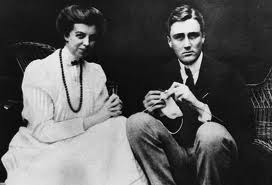
Sig Ruman: German-American actor known for his comic portrayals of pompous villains. Born in Hamburg, he studied electrical engineering before serving with the Imperial German army during the First World War. After moving to the United States in 1924, his acting career blossomed. Befriending playwright George S. Kaufman and theater critic Alexander Woollcott, he enjoyed success in many Broadway productions. With the advent of talkies, Ruman became a favorite of the Marx Brothers, appearing in A Night at the Opera, A Day at the Races, and A Night in Casablanca. His German accent and large stature kept him busy during World War II, playing sinister Nazi characters in a series of wartime thrillers. During this period, he also appeared in several films by Ernst Lubitsch, a fellow German immigrant. Despite poor health during the 50's and 1960s, Ruman continued to find work, making many guest appearances on television. In 1953, he played what is perhaps his most famous role: that of "Schultz", the bumbling, two-faced POW camp guard in Stalag 17.
1899 South Africa: The Boer War begins between the British Empire and the Boers of the Transvaal and Orange Free State. [For further details, Click here. Note: The attitude of Kaiser Wilhelm II was to increase tension between Britain and Germany.—Ed]
1914 World War I: The Cathedral of Notre Dame suffers minor damage during an air raid on Paris.
List Regiment: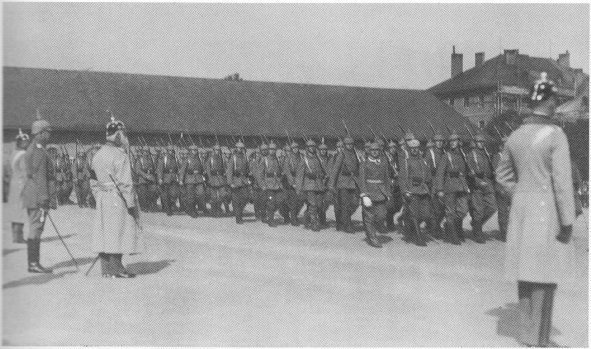
After having set off on foot on October 9, the 1st Company of the 16th Bavarian Reserve Infantry—including Infrantry Recruit Adolf Hitler—finally reach Lechfeld in mid afternoon for further training. Franz Rubenhauer, an officer who will provide much of the material for the regimental history, will later write:
We still gratefully remember the warm welcome we received from the local population—in the places where we had our living quarters—after the exhausting daily exercises on the vast Lechfeld, or from the practice firing range in the meadows of the Lech, singing marching songs with high and clear voices; old and young were out and about and marched with us. After we were dismissed for the day, they took us back into their homes, where the food waited ready for us on their stoves. [For further details, Click here.]
1915 World War I: Various:
Click to Enlarge
Fromelles Watercolor, 1915, by Hitler
List Regiment (Oct 7 - 14): Gefreiter Adolf Hitler's serves with 16 Reserve Infantry Regiment at Fromelles. [For further details, Click here.]
Edith Cavell: Despite international protests, Edith Cavell, an English nurse in Belgium, is executed in Brussels by Germans, for aiding the escape of Allied prisoners. For Maitre G. de Leval on Edith Cavell click here. Hugh Gibson on Edith Cavell click here. Stirling Gahan on Edith Cavell click here. Arthur Zimmermann on Edith Cavell click here.
US Minister to Belgium Brand Whitlock's Letter to Baron von der Lancken and German Military Governor Baron von Bissing:
I have just heard that Miss Cavell, a British subject, and consequently under the protection of my Legation, was this morning condemned to death by court-martial. If my information is correct, the sentence in the present case is more severe than all the others that have been passed in similar cases which have been tried by the same court, and, without going into the reasons for such a drastic sentence, I feel that I have the right to appeal to his Excellency the Governor-General's feelings of humanity and generosity in Miss Cavell's favor, and to ask that the death penalty passed on Miss Cavell may be commuted, and that this unfortunate woman shall not be executed.
Bulgaria enters World War I:
On this day in 1915, Prime Minister Vasil Radoslavov of Bulgaria issues a statement announcing his country's entrance into the First World War on the side of the Central Powers.
Secretly courted by both sides in World War I as a potential ally in the tumultuous Balkan region, Bulgaria eventually decided in favor of the Central Powers. In his statement of October 11, 1916, Radoslavov argued that confronting the Allied powers—Britain, France and Russia—alongside Germany, Austria-Hungary and the Ottoman Empire was desirable not only for economic reasons, as the latter two countries were Bulgaria's chief partners in trade, but also as a way for the country to defend itself against the aggression of Serbia, the Russian ally and major power in the Balkans that Radoslavov considered to be his country's "greatest foe."
"Today we see races that are fighting, not indeed for ideals, but solely for their material interests," Radoslavov maintained. "The more, therefore, we are bound to a country in a material way, the greater is that country's interest in our maintenance and increase, since thereby that one will profit who helps us and is tied to us by economic bonds . . . . The figures show that our trade, our interests, and our economic life are inseparably linked with Turkey, Germany, and Austria-Hungary . . . . "
Bulgaria acted quickly after its declaration of war, invading the Serbian province of Macedonia and in the process driving a wedge in front of Allied forces in Greece in their attempts to aid the Serbian army. In the summer of 1916, Bulgaria invaded and occupied a section of then-neutral Greece, mounting a major offensive in August that was only halted by British aerial and naval attacks. A stalemate ensued until 1918, when the Allies began to put more pressure on the Germans on the Western Front, forcing them to transfer a number of troops from the Salonika front—as the battlegrounds of northern Greece and Macedonia were known—where they had been aiding their Bulgarian allies. Disintegrating morale and growing discontent among the Bulgarian troops and on the home front were compounded by a new Allied offensive, launched in mid-September. On September 24, the Bulgarian government authorized its army's commander to seek an armistice. Bulgaria formally exited World War I on September 29, 1918, having lost some 90,000 soldiers over the course of the conflict. (History.com)
1916 List Regiment (Oct 9 - Dec 3):
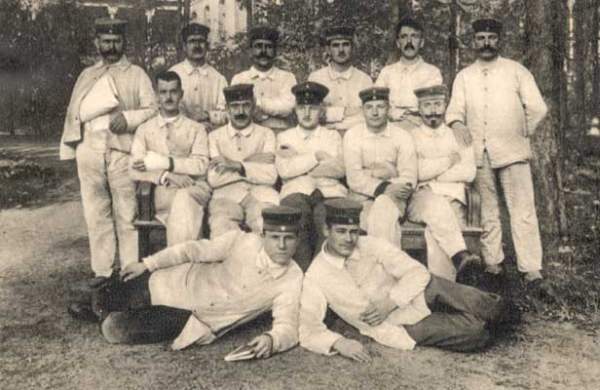
Hitler, who had been fighting almost continuously for two years, finds himself on a hospital train headed for a Red Cross hospital in Beelitz, near Berlin. While his wound is serious, he will recover quickly, and will later write Balthaser Brandmayer: "Am suffering from hunger-induced typhus because I cannot eat bread; additionally I am adamantly denied any sort of jam." [For further details, Click here.]
1917 World War I (Sep 30-Oct 17):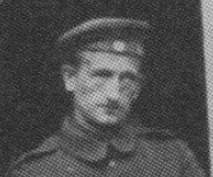
Hitler takes an eighteen-day furlough to accompany Schmidt [above] on a visit to his sister in Dresden with him. After sightseeing stops at Brussels and Cologne, they hit Leipzig, a city Hitler especially enjoys. He is impressed by the 300-foot tall monument, Battle of the Nations, honoring the war-dead of 1812. "This has nothing to do with art," he tells Schmidt (above), "but it is enormous and beautiful." After spending some time with Schmidt in Dresden, Hitler goes off by himself to Berlin to spend a few days with yet another front-line comrade. In a postcard to Schmidt, he writes: "The city is marvelous. A real world capital. Traffic is still tremendous. Am gone almost all day. Now finally have opportunity to study the museums a little better. In short: there is nothing lacking." [For further details, Click here.]
1918 World War I (Sep 28-Oct 15):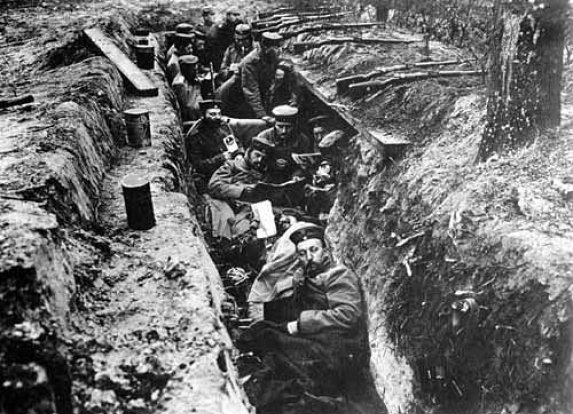
Gefreiter Adolf Hitler participates in defensive operations in Flanders with 3 Company, 16 Bavarian Reserve Infantry Regiment. [For further details, Click here.]
1923 Weimar: The German mark falls to 10 billion per pound, 4 billion per dollar:
The harsh reparation payments imposed on Germany led the mark to depreciate against foreign currencies. Also, the new democratic socialist leaders had promised the people all types of bounties--increased wages, reduced hours, an expanded educational system, and new social benefits. But all this meant a vastly increased demand on a limited production capacity. For these reasons inflation resumed after the peace until by February 1920 the price level was five times as high as it had been at the armistice. Yet during this same time the amount of currency in circulation had only doubled. Prices were in fact rising much faster than the rate at which money was being printed. Therefore, reasoned the officials, the price inflation could hardly be blamed on the government."
[See: Did Hitler's Leadership Save the German Economy?]1931 Weimar: Meeting in Harzburg of the Nazis and Nationalists: The Hugenberg-Hitler alliance. They demand that Bruening resign, as Hitler makes his own independence clear by reading a proclamation of his own to his own Nazi party members.
The economic slump of 1929 opened a new period of both economic and political instability. Hitler made an alliance with the Nationalist Alfred Hugenberg in a campaign against the Young Plan. Through it, Hitler was able, for the first time, to reach a nationwide audience with the help of Hugenberg's Nationalist party organization and the newspapers it controlled. It also enabled him to position himself as a gifted agitator to the industrial/business [magnates] who controlled political funds. He was anxious to use them to establish a strong right wing, anti working-class government."
1933 Various:
The American Federation of Labor
US Ambassador Christopher Dodd criticizes the Nazi regime during an address to the American Chamber of Commerce in Berlin.
1935 League of Nations: Fifty-one members vote economic sanctions against Italy.
1939 Various: and other US scientists, after having previously written a letter on the subject, personally outline to President Roosevelt the possibilities of developing an atomic bomb.
War at Sea: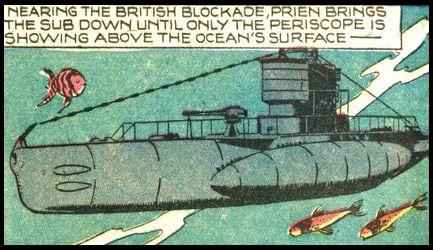
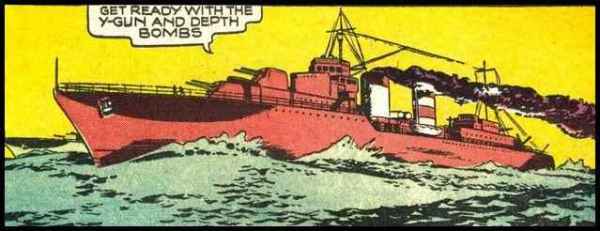
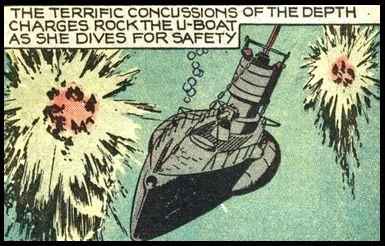
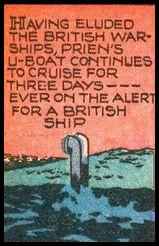
Guenther Prien's U-47, having departed Kiel on October 8, runs the enemy blockade on its way to attack Scapa Flow in the Orkney Islands north of Scotland.
The Soviet Union and Finland begin negotiations concerning the establishment of Soviet air bases on Finnish soil.
Barbarossa:
Rumors of an impending capture of Moscow by the German Army cause thousands of civilians to flee the city. [See: Was Adolf Hitler a 'Great' Military Leader?]Balkans: Armed insurgents from the People's Liberation Army of Macedonia attack Axis-occupied zones in the city of Prilep, beginning the National Liberation War of Macedonia. [For further information, click here.]
From the Diary of Rear Admiral Giichi Nakahara:
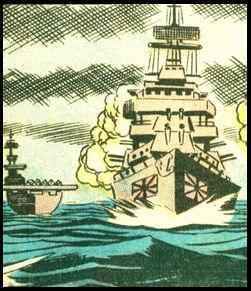
COMMANDER IN CHIEF OF THE COMBINED FLEET—The Fleet is now under training aiming at DEC 8. Although it is to be hoped that the situation would be improving in peace, yet he (Yamamoto) is quite ready for the worst case. So he need not come up to Tokyo in case the worst turns out. The order to go forward is the order to push forth to the enemy. The most important is this: in relation to the diplomatic situation, the high time to rise in war is one of the most difficult to decide—one may be too late in taking the initiative and the other may be too early. This has a close relationship with the war preperations. In regard to operational affairs and other matters concerning operational preperations, liaison should be kept more closely. (Dillon)
[See: Countdown to Infamy: Timeline to Pearl Harbor.]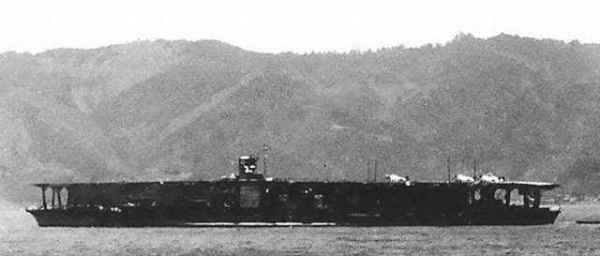
Admiral Yamamoto to Rear Admiral Teikichi Hori:
Many thanks for your kindness which you gave me on my departure. I have received your letter which you sent to me from Ofuna.
1. I beg your favor of looking after my dependents.
2. It seems to me that the situation has already reached its critical point. It would be lamentable indeed for us to give up all hope, presuming this situation as a fact of "God's will be done." However, it would be nonsense so late now to accuse anyone of the responsibility of leading Japan into this situation. In Japan today, the circumstance seems to be such that only the Emperor pays his utmost concerns about the situation, and also that he would be the only and the last man who could check the tide. But even his decision, if made, would be difficult to be effective in present Japan. I cannot help thinking so.
3. My present situation is very strange. Because I have been assigned the mission, entirely against my private opinion, and also I am expected to do my best. Alas, maybe, this is my fate.
1942 World War II: United States defeats Japanese in the Battle of Cape Esperance:
On this day in 1942, the American Navy intercepts a Japanese fleet of ships on their way to reinforce troops at Guadalcanal. The Navy succeeded in its operation, sinking a majority of the ships.
The battle for Guadalcanal began in August, when the Marines landed in the first American offensive of the war. The ground fighting saw U.S. troops gain a decisive edge, wiping out detachments and regiments in brutal combat. The most effective Japanese counterstrikes came from the air and sea, with bombing raids harassing the Marines and threatening their dwindling supplies. But before the Japanese could reinforce their own ground troops, the Navy went to work.
The battle of Cape Esperance, on the northwest coast of Guadalcanal Island, commenced at night between surface ships; all Japanese reinforcements came at night, an operation nicknamed the Tokyo Express. The Navy sank one Japanese cruiser, the Furutaka, and three destroyers, while losing only one of their own destroyers. In characteristic fashion, those Japanese sailors who found themselves floundering in the water refused rescue by Americans; they preferred to be devoured by the sharks as a fate less shameful than capture.
Unfortunately, the loss of American manpower was greater than that of hardware: 48 sailors from the American destroyer Duncan were the victims of crossfire between the belligerents, and more than a hundred others died when an American cruiser turned on a searchlight to better target a Japanese ship. It also had the unintended effect of illuminating the sailors of the cruiser, making them easy targets.
The American Navy continued to harass Japanese ships trying to reinforce the Japanese position on the island; relatively few Japanese troops made it ashore. By the end of 1942, the Japanese were ready to evacuate the island--in defeat. (History.com)
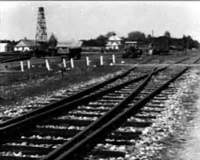
1943 Holocaust: The last train of deportees to be gassed at Sobibor arrives at the camp.
1944 World War II: Various:
The Red Army
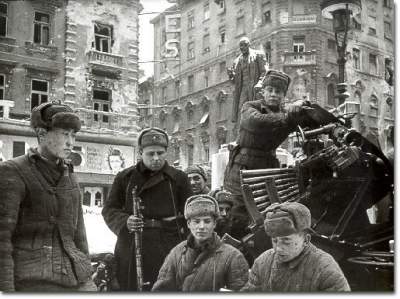
Hungary and the Soviet Union begin negotiations for a ceasefire between them.
Aachen: The veteran 1st US Infantry Division of the First Army enters the outskirts of Aachen, Germany. Hitler orders Aachen's defenders to resist to the last man.
Churchill (from Moscow) to FDR:

We have found an extraordinary atmosphere of goodwill here, and we have sent you a joint message. You may be sure we shall handle everything so as not to commit you. The arrangements we have made with Averell are, I think, satisfactory to him, and do not preclude necessary contacts, which we must have to do any good. Of all these I shall give you a faithful report.
2. It is absolutely necessary we should try to get a common mind about the Balkans, so that we may prevent civil war from breaking out in several countries, when probably you and I would be in sympathy with one side and U.J. with the other. I shall keep you informed of all this, and nothing will be settled except preliminary agreements between Britain and Russia, subject to further discussion and melting down with you. On this basis I am sure you will not mind our trying to have a full meeting of the minds with the Russians.
3. I have not yet received your account of what part of the Pacific operations we may mention to Stalin and his officers. I should like to have this, otherwise in conversation with him I may go beyond what you wish to be said. Meanwhile, I will be very careful. We have not touched upon Dumbarton Oaks, except to say it is barred, at your desire. However, Stalin at lunch today spoke in praise of the meeting and of the very great measure of agreement that has been arrived at there. Stalin also in his speech at this luncheon animadverted harshly upon Japan as being an aggressor nation. I have little doubt from our talks that he will declare was upon them as soon as Germany is beaten. But surely Averell and Deane should be in a position not merely to ask him to do certain things, but also to tell him, in outline at any rate, the kind of things you are going to do yourself, and we are going to help you do.
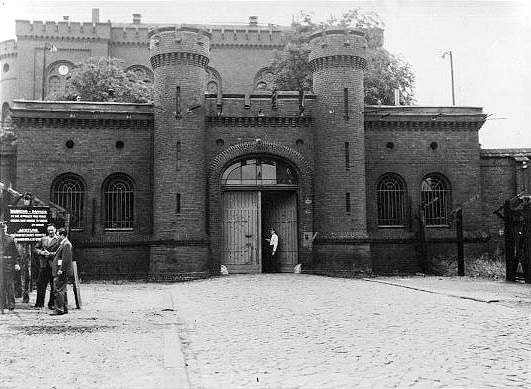
1947 Spandau Prison: From Spandau: The Secret Diaries, by Albert Speer: Today, Saturday, we had our first Spandau religious service. . . . The French chaplain, Casalis, gave a sermon on the subject: "The lepers in Israel were cut off from the community of the people by a host of legal prohibitions; these are as insurmountable as a prison wall." Raeder, Doenitz, and Schirach take offense; they contend that the chaplain called them "lepers." Fierce discussions rage in the yard and the washroom. 1950: From the Chicago Daily News: Telford Taylor proposed yesterday ... creation of a UNO tribunal to punish all war crimes committed in Korea--by Koreans, the UN Allies and even the Russians. The prosecutor said in an interview...that trials must not be run on the lines of those at Nuremberg when only the defeated Germans were in the dock. "If international law is to have meaning," he said, "we must bring both sides to court or alternately admit that extenuating circumstances are valid for both sides and let everyone go their own way."
1998 Holocaust: Pope John Paul II canonizes the first Jewish-born saint of the modern era: Edith Stein, a Catholic nun killed at Auschwitz. (AP)
Edited by Levi Bookin (Copy editor) Click to join 3rdReichStudies Disclaimer: This site includes diverse and controversial materials--such as excerpts from the writings of racists and anti-Semites--so that its readers can learn the nature and extent of hate and anti-Semitic discourse. It is our sincere belief that only the informed citizen can prevail over the ignorance of Racialist "thought." Far from approving these writings, this site condemns racism in all of its forms and manifestations.
levi.bookin@gmail.com











Fair Use Notice: This site may contain copyrighted material the use of which has not always been specifically authorized by the copyright owner. We are making such material available in our efforts to advance understanding of historical, political, human rights, economic, democracy, scientific, environmental, and social justice issues, etc. We believe this constitutes a "fair use" of any such copyrighted material as provided for in section 107 of the US Copyright Law. In accordance with Title 17 U.S.C. Section 107, the material on this site is distributed without profit to those who have expressed a prior interest in receiving the included information for research and educational purposes. If you wish to use copyrighted material from this site for purposes of your own that go beyond 'fair use', you must obtain permission from the copyright owner.
Please Note: The list-owner and the moderator of 3rdReichStudies are not responsible for, and do not necessarily approve of, the random ads placed on our pages by our web server. They are the unfortunate price one pays for a 'free' website.



